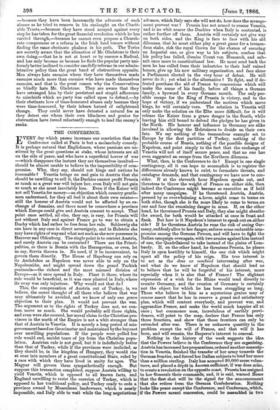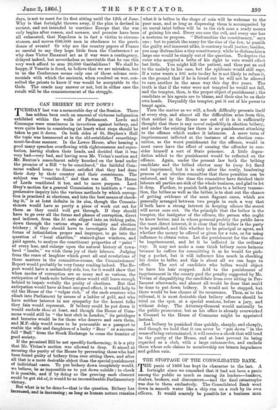THE CONFERENCE.
EVERY day which passes increases our conviction that the Conference called at Paris is but a melancholy comedy. It is perhaps natural that Englishmen, whose passions are un- stirred by the great questions at stake, whose interests are all on the side of peace, and who have a superficial horror of war —which disappears the instant they are themselves insulted— should be almost unable to believe in the impossibility of com- promise. Why, they say, should not kings and nations be reasonable Venetia brings no real gain to Austria that she should be unwilling to sell it, the Duchies cannot profit Prussia as much as a great war will injure her, even Italy will not gain so much as she must inevitably lose. Even if the Kaiser will not sell Venetia for money—an objection which country gentle- men understand, for they all feel it about their own estates— still the honour of Austria would not be affected by an ex- change of domains, and there must be somewhere a province which Europe could give and Austria consent to accept. That point once settled, all else, they say, is easy, for Prussia will not without Italy and against France go to war to obtain a Duchy which had rather be free from her rule. Schleswig she can have in any case in direct sovereignty, and in Holstein she may have rights of wayand what not such as she now possesses in Hanover and Oldenburg. The single point is to content Austria, and surely Austria can be contented ? There are the Princi- palities, or there is Bosnia with the Herzegovina, or even, let us say, Sends thrown in. No need, if it be inconvenient, to govern them directly. The House of Hapsburg can rely on its Archdukes as Napoleon was never able to rely on the Napoleonidte, and might spread down the grand Turkish peninsula—the richest and the most misused division of Europe—as it once spread in Italy. Plant it there, where its rule would be beneficial, as it was once planted in Italy, where its sway was only injurious. Why would not that do ? This, the compensation of Austria out of Turkey, is, we believe, the secret thought of all those who believe that war may ultimately be avoided, and we know of only one grave objection to their plan. It would not prevent the war. The argument as to the rights of Turkey does not, we con- fess, move us much. She would probably sell those rights, and even were she coerced, her moral claim to the Christian pro- vinces in the north of the Empire is not a whit stronger than that of Austria to Venetia. It is merely a long period of mils- governmenthased on the scimetar and maintained bythe bayonet over unwilling populations. If the people were polled her rule would end, amidst tears of joy from the Christian popu- lation. Austrian rule is not good, but it is indefinitely better than that of Turkey, while if the provinces were included, an they should be, in the kingdom of Hungary, they would rise at once into members of a great constitutional State, ruled by a race with which they have lived in amity for ages. The Magyar will govern them sympathetically enough. But suppose this transaction completed, suppose Austria willing to yield Venetia, which is opposed to all known facts, and England unwilling to resist the coercion of Turkey, which is opposed to her traditional policy, and Turkey ready to cede a province owned by Muasulrnan landowners, which is nearly impossible, and Italy able to wait while the long negotiations advance, which Italy says she will not do, how does the arrange- ment prevent war Prussia has not armed to rescue Venetia, and is no whit nearer the Duchies when Italy is contented, is rather further off them. Austria will certainly not give way on both sides, and the King is face to face with his old dilemma, that he must either play a great game for a tremen- dous stake, risk the royal Crown for the chance of securing an Imperial one, or give way to his subjects, confess that his policy has failed, dismiss Count von Bismarck, and sub- mit once more to constitutional law. He must send back the men he has called from their industries to their half ruined homes, give up his new military organization, and face alone a Parliament elected in the very hour of defeat. He will never do it ; yet what is the alternative ? To fight, and if de- feated purchase the aid of France by concessions which will make the name of his family, before all things a German, family, a byeword in every German mouth. The only pos- sible escape for the King of Prussia is victory, and to the' hope of victory, if we Juiderstand the motives which move' kings, he will certainly turn. The solution in Venetia will only make the solution on the Elbe more difficult, for it will release the Kaiser from a grave danger in. the South, while leaving him still bound to defend the pledges he has given in the North. His honour and influence in Germany are alike- involved in allowing the Holsteinera to decide on their own fate. We say nothing of the tremendous example set to Europe by the first partition of Turkey, nothing of the- probable course of Russia, nothing of the possible designs of Napoleon, and point simply to the fact that the exchange or Venetia will not of itself secure peace, and, that no one has- even suggested an escape from the Northern dilemma. What, then, is the Conference to do ? Except in one single contingency, all it can hope to accomplish is to register the differences already known to exist, to formulate threats, and catalogue demands, and that contingency we have now to con- alder. If at the eleventh hour Napoleon speaks out, . and threatens to throw the weight of France on, either side, then indeed the Conference might become as executive as if held after many campaigns. If he threatened. Austria, Austria, pressed by so overwhelming a.force, might come to terms on both sides, though she is far more likely to come to terms,on one and face the remaining danger in arms. If, on the 'other' hand, he threatened Prussia and Italy, they also might sheathe- the sword, for both would, be attacked at once in front and flank. But how is it Napoleon's interest to speak out on, either- side If he threatens Austria he runs the risk of seeing Ger-- many, suddenly alive to her danger, enforce some endurable com- promise among the German Powers, and will have to fight the' Italian campaign overagain, with two armies against him instead of one, the Quadrilateral to take instead of the plains of Lom- bardy. If, on the other hand, he threatens Prussia, he places Italyin open hostility to himself, the one risk which might upset all the policy of his reign. His true interest is- to act as the dews as machind intervening after war, and what do we know of Napoleon that should lead us- to believe that he will be forgetful of his interest, more• especially when it is also that of France ? The slightest expression of a wish for the Rhine would tend directly to. reunite Germany, and the reunion of Germany is certainly not the object for which he has been struggling so long._ Those who believe in him as a mysterious genius may of course assert that he has in reserve a grand and satisfactory plan, which will content everybody, and prevent war, and aggrandize France, and make the world much happier all at once ; but commoner men, incredulous of earthly provi- deuces, will point to the map, declare that France has only three frontiers, and show that those frontiers can only be. extended after war. There is no unknown quantity in the' problem except the will of France, and that will it has been, and will remain, the Emperor's interest to conceal.
Nothing in the history of the week suggests the idea that the Powers believe in the Conference they are organizing. Austria has increased herpreparations, ordered another conscrip- tion in Venetia, finished the transfer of her army towards the German frontier, and forced her Italian subjects to lend her more than a million sterling-. Italy has accepted 20,000 more volun- teers, and placed a depot in Ancona sufficient, if war does arise,, to create a revolution on the opposite coast. Prussia has assigned.
to her Generals their commands, and, it is said, warned Hesse that the first shot will be the signal for the announcement that she retires from the German Confederation. Nothing looks like peace except the Conference, and Conference, which, if the Powers meant concession, could be assembled in two days, is not to meet for its first sitting until the 12th of June. Why is that fortnight thrown away, if the plan is devised in earnest, and not intended to convince Europe that the war only begins after reason, and menace, and promise have been all exhausted, that Napoleon is in fact a victim to circum- stances, and moves 600,000 men in obedience to the provi- dence of events? Or why are the country papers of France so careful to say they hope little from the Conference ? or why does Victor Emanuel act as if war were a contingency, delayed indeed, but nevertheless so inevitable that he can this very week afford to arm 20,000 Garibaldians ? We shall be happy, if Venetia is freed, to believe that we are mistaken, but to us the Conference seems only one of those solemn cere- monials with which the ancients, when resolved on war, con- sulted the priests to know if war would be acceptable to the Gods. The oracle may answer or not, but in either case the result will be the commencement of the struggle.































 Previous page
Previous page